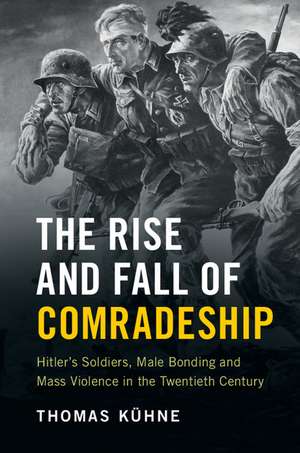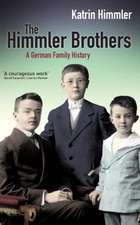The Rise and Fall of Comradeship: Hitler's Soldiers, Male Bonding and Mass Violence in the Twentieth Century
Autor Thomas Kühneen Limba Engleză Paperback – 6 feb 2017
Preț: 225.20 lei
Nou
Puncte Express: 338
Preț estimativ în valută:
43.11€ • 46.84$ • 36.23£
43.11€ • 46.84$ • 36.23£
Carte disponibilă
Livrare economică 31 martie-14 aprilie
Preluare comenzi: 021 569.72.76
Specificații
ISBN-13: 9781107658288
ISBN-10: 1107658284
Pagini: 310
Dimensiuni: 152 x 228 x 16 mm
Greutate: 0.43 kg
Editura: Cambridge University Press
Colecția Cambridge University Press
Locul publicării:New York, United States
ISBN-10: 1107658284
Pagini: 310
Dimensiuni: 152 x 228 x 16 mm
Greutate: 0.43 kg
Editura: Cambridge University Press
Colecția Cambridge University Press
Locul publicării:New York, United States
Cuprins
Acknowledgements; Introduction: a concept from a different world; Part I. The Myth of Comradeship, 1914–1939: 1. Healing; 2. Coalescence; 3. Steeling; Part II. The Practice of Comradeship, 1939–1945: 4. Assimilation; 5. Megalomania; 6. Nemesis; Part III. The Decline of Comradeship: 7. Privatisation; 8. Integration; 9. Demonisation; Conclusion: protean masculinity and Germany's twentieth century; Index.
Recenzii
'Probing into the Janus-faced quality of comradeship, Thomas Kühne illuminates the moral world of Nazi Germany on its own terms, a world in which most German soldiers acted as they did, not because they were forced to do so, but because they thought it was right. Obsessed with the 'virtue' of being held in high esteem by their 'masculine' comrades, they had scant concern for their victims. This book makes an essential contribution to understanding the capacity to commit terrible atrocities without remorse in Nazi Germany.' Christopher Browning, University of North Carolina
'War is a powerful generator of solidarity. Thomas Kühne explores the rise and decline of the German version of this phenomenon, Kameradschaft. It was a myth that was lived in World War II and came to shape male identity into the late twentieth century. How, why and with what consequences this happened is the subject of this powerful exploration.' Michael Geyer, University of Chicago
'An original, comprehensive, and incisive analysis of the concept, myth, reality, and ultimate disintegration of soldiers' comradeship in modern Germany and its profound implications for the manner in which German men imagined war, perpetrated violence, and for long managed to avoid coming to terms with their complicity in the crimes of the Nazi regime. Set within the larger context of European and American ideas and practices of military cohesion, this is an important book that should be read by all students of modern and military history.' Omer Bartov, Brown University, Rhode Island
'War is a powerful generator of solidarity. Thomas Kühne explores the rise and decline of the German version of this phenomenon, Kameradschaft. It was a myth that was lived in World War II and came to shape male identity into the late twentieth century. How, why and with what consequences this happened is the subject of this powerful exploration.' Michael Geyer, University of Chicago
'An original, comprehensive, and incisive analysis of the concept, myth, reality, and ultimate disintegration of soldiers' comradeship in modern Germany and its profound implications for the manner in which German men imagined war, perpetrated violence, and for long managed to avoid coming to terms with their complicity in the crimes of the Nazi regime. Set within the larger context of European and American ideas and practices of military cohesion, this is an important book that should be read by all students of modern and military history.' Omer Bartov, Brown University, Rhode Island
Notă biografică
Descriere
This book reveals how ideas of comradeship shaped the actions and mindsets of ordinary German soldiers across the twentieth century.













